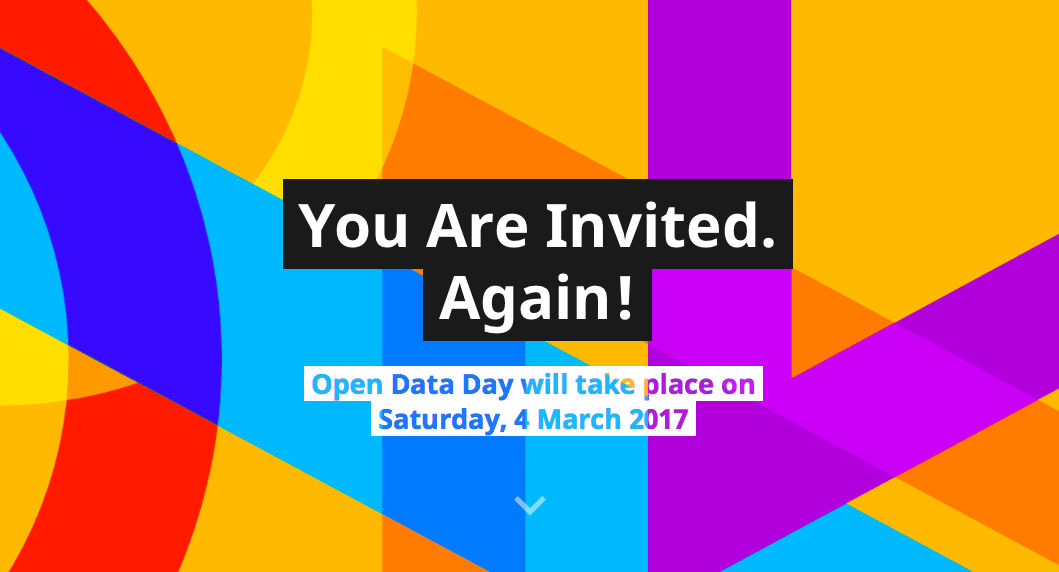Open Data Day in Moscow

For several years, activists and lovers of open data on a pre-agreed day hold more than a hundred events of various formats in different cities and countries. This year this day was March 4th, for which 145 events have already been planned in a dozen countries. One of them will be Open Data Day in Moscow (you need to register for participation), for which we have prepared a lot of interesting things: from new data sets that can be used on the hackathon, to master classes and lectures not only on state finances that are familiar to us, but also on business models of projects using open data, or on the ethics of using big data.
The program of the two-day event (March 4-5) can be divided into two formats: “lecture hall” with master classes, discussions and presentations in several areas (“Business”, “City”, “Ethics”, “Media”, “NKO” ) and hakaton.
Section "Business"
')
“How to make money on open data?” Is a difficult question, on which almost all open data activists sooner or later think. Ivan Begtin, director of ANO Information Culture, and curator of this section, has already shared his ideas on the website roem.ru and in a post on Habré . The Open Data Institute , the GovLab laboratory, and the OpenData500 project, which investigates the cases of specific companies in the United States, Canada, Mexico and other countries, writes about the monetization of projects based on open data. Invited representatives of companies will tell about Russian examples.
Section "City"
Do open data help or hinder our quality of life? What problems of the urban environment can be solved using open data? - The experts, led by the curator of the section Andrei Karmatsky, the author of the channel in the Telegram about urban data and the head of Urbica , specializing in the analysis and visualization of complex data arrays, will share their knowledge of data analysis, urbanistics and the creation of urban services. By the way, over the past week, several interesting studies were published on this topic: for example, a Yandex study on which areas of Moscow are suitable for life and which are for entertainment , a study by the London public transport operator on passenger movements based on their smartphone data , or how to analyze attendance Park using a bench designed in Boston .
Section "Ethics"
Arthur Hachuyan, head of SocialDataHub , a company engaged in the development of intelligent data analysis systems, will moderate the discussion of the dark side of big data, life in the era of “Big Brother” and the boundaries of the moral and ethical aspect of using technologies that collect a huge amount of personal information about citizens from open access for the unknown goals. On this topic, a recent study of how data capitalists are cashing in on our privacy .
Section "Media"
In this section, participants will discuss how open data changes the media, what trends are in visualization and data journalism, and will try to answer the question: Open data in the media is a dialogue between people, “society and state” or “business and government”? The section will be supervised by Maria Pilgun, Head of the Master Program in Data Journalism at HSE.
Section "NPO"
Ivan Zasursky, President of the Association of Internet Publishers , will moderate the discussion of open licenses and the importance of their use for non-profit organizations, and the speakers of the section will talk about the OpenAccess movement and talk about open access to the results of NPO projects. Few people know that non-profit organizations today are more closed than commercial companies or state government bodies - we hope that this section will be the first step towards their openness.
Hackathon
Almost no Infoculture event can do without hackathon. Open Data Day is no exception. This time, we are not just inviting developers, journalists, analysts, designers, activists and students, and offer well-known data sets (for example, criminal statistics and traffic accidents , open data on culture , useful links on data journalism , resources for open budgets and public finances , always available data on the state contracts of the project of the State expenses (the OIG project)), but also working on obtaining new datasets. Among the “novelties” there will be data on living quarters from CIAN - this is a base of 117 thousand objects with addresses, coordinates, prices and a bunch of other indicators (there are two important limitations to the specified data set, which you can read here ), data from the Institute for Law Enforcement Problems We also prepare arrays of data on the finances of the media and NGOs for ten thousand decisions of arbitration courts of first instance.
Open Data Day, in our opinion, is an important event for the community, so we launched a Russian-language website , where we would be happy to post information about events in other Russian cities. Suggestions, requests, questions and even requests for data are waiting in the comments.
Source: https://habr.com/ru/post/322100/
All Articles